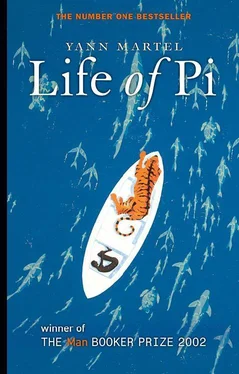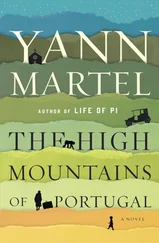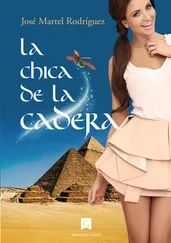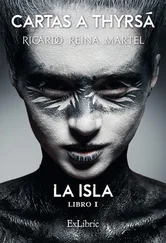Yann Martel - Life of Pi
Здесь есть возможность читать онлайн «Yann Martel - Life of Pi» весь текст электронной книги совершенно бесплатно (целиком полную версию без сокращений). В некоторых случаях можно слушать аудио, скачать через торрент в формате fb2 и присутствует краткое содержание. Год выпуска: 2002, ISBN: 2002, Издательство: Canongate Books, Жанр: Современная проза, на английском языке. Описание произведения, (предисловие) а так же отзывы посетителей доступны на портале библиотеки ЛибКат.
- Название:Life of Pi
- Автор:
- Издательство:Canongate Books
- Жанр:
- Год:2002
- ISBN:9781847674210
- Рейтинг книги:3 / 5. Голосов: 1
-
Избранное:Добавить в избранное
- Отзывы:
-
Ваша оценка:
- 60
- 1
- 2
- 3
- 4
- 5
Life of Pi: краткое содержание, описание и аннотация
Предлагаем к чтению аннотацию, описание, краткое содержание или предисловие (зависит от того, что написал сам автор книги «Life of Pi»). Если вы не нашли необходимую информацию о книге — напишите в комментариях, мы постараемся отыскать её.
Life of Pi — читать онлайн бесплатно полную книгу (весь текст) целиком
Ниже представлен текст книги, разбитый по страницам. Система сохранения места последней прочитанной страницы, позволяет с удобством читать онлайн бесплатно книгу «Life of Pi», без необходимости каждый раз заново искать на чём Вы остановились. Поставьте закладку, и сможете в любой момент перейти на страницу, на которой закончили чтение.
Интервал:
Закладка:
I was on my side. It was an hour or two past noon on a day of quiet sunshine and gentle breeze. I had slept a short while, a diluted sleep that had brought no rest and no dreams. I turned over to my other side, expending as little energy as possible in doing so. I opened my eyes.
In the near distance I saw trees. I did not react. I was certain it was an illusion that a few blinks would make disappear.
The trees remained. In fact, they grew to be a forest. They were part of a low-lying island. I pushed myself up. I continued to disbelieve my eyes. But it was a thrill to be deluded in such a high-quality way. The trees were beautiful. They were like none I had ever seen before. They had a pale bark, and equally distributed branches that carried an amazing profusion of leaves. These leaves were brilliantly green, a green so bright and emerald that, next to it, vegetation during the monsoons was drab olive.
I blinked deliberately, expecting my eyelids to act like lumberjacks. But the trees would not fall.
I looked down. I was both satisfied and disappointed with what I saw. The island had no soil. Not that the trees stood in water. Rather, they stood in what appeared to be a dense mass of vegetation, as sparkling green as the leaves. Who had ever heard of land with no soil? With trees growing out of pure vegetation? I felt satisfaction because such a geology confirmed that I was right, that this island was a chimera, a play of the mind. By the same token I felt disappointment because an island, any island, however strange, would have been very good to come upon.
Since the trees continued to stand, I continued to look. To take in green, after so much blue, was like music to my eyes. Green is a lovely colour. It is the colour of Islam. It is my favourite colour.
The current gently pushed the lifeboat closer to the illusion. Its shore could not be called a beach, there being neither sand nor pebbles, and there was no pounding of surf either, since the waves that fell upon the island simply vanished into its porosity. From a ridge some three hundred yards inland, the island sloped to the sea and, forty or so yards into it, fell off precipitously, disappearing from sight into the depths of the Pacific, surely the smallest continental shelf on record.
I was getting used to the mental delusion. To make it last I refrained from putting a strain on it; when the lifeboat nudged the island, I did not move, only continued to dream. The fabric of the island seemed to be an intricate, tightly webbed mass of tube-shaped seaweed, in diameter a little thicker than two fingers. What a fanciful island, I thought.
After some minutes I crept up to the side of the boat. “Look for green,” said the survival manual. Well, this was green. In fact, it was chlorophyll heaven. A green to outshine food colouring and flashing neon lights. A green to get drunk on. “Ultimately, a foot is the only good judge of land,” pursued the manual. The island was within reach of a foot. To judge—and be disappointed—or not to judge, that was the question.
I decided to judge. I looked about to see if there were sharks. There were none. I turned on my stomach, and holding on to the tarpaulin, I slowly brought a leg down. My foot entered the sea. It was pleasingly cool. The island lay just a little further down, shimmering in the water. I stretched. I expected the bubble of illusion to burst at any second.
It did not. My foot sank into clear water and met the rubbery resistance of something flexible but solid. I put more weight down. The illusion would not give. I put my full weight on my foot. Still I did not sink. Still I did not believe.
Finally, it was my nose that was the judge of land. It came to my olfactory sense, full and fresh, overwhelming: the smell of vegetation. I gasped. After months of nothing but salt-water-bleached smells, this reek of vegetable organic matter was intoxicating. It was then that I believed, and the only thing that sank was my mind; my thought process became disjointed. My leg began to shake.
“My God! My God!” I whimpered.
I fell overboard.
The combined shock of solid land and cool water gave me the strength to pull myself forward onto the island. I babbled incoherent thanks to God and collapsed.
But I could not stay still. I was too excited. I attempted to get to my feet. Blood rushed away from my head. The ground shook violently. A dizzying blindness overcame me. I thought I would faint. I steadied myself. All I seemed able to do was pant. I managed to sit up.
“Richard Parker! Land! Land! We are saved!” I shouted.
The smell of vegetation was extraordinarily strong. As for the greenness, it was so fresh and soothing that strength and comfort seemed to be physically pouring into my system through my eyes.
What was this strange, tubular seaweed, so intricately entangled? Was it edible? It seemed to be a variety of marine algae, but quite rigid, far more so than normal algae. The feel of it in the hand was wet and as of something crunchy. I pulled at it. Strands of it broke off without too much effort. In cross-section it consisted of two concentric walls: the wet, slightly rough outer wall, so vibrantly green, and an inner wall midway between the outer wall and the core of the algae. The division in the two tubes that resulted was very plain: the centre tube was white in colour, while the tube that surrounded it was decreasingly green as it approached the inner wall. I brought a piece of the algae to my nose. Beyond the agreeable fragrance of the vegetable, it had a neutral smell. I licked it. My pulse quickened. The algae was wet with fresh water.
I bit into it. My chops were in for a shock. The inner tube was bitterly salty—but the outer was not only edible, it was delicious. My tongue began to tremble as if it were a finger flipping through a dictionary, trying to find a long-forgotten word. It found it, and my eyes closed with pleasure at hearing it: sweet . Not as in good , but as in sugary . Turtles and fish are many things, but they are never, ever sugary. The algae had a light sweetness that outdid in delight even the sap of our maple trees here in Canada. In consistency, the closest I can compare it to is water chestnuts.
Saliva forcefully oozed through the dry pastiness of my mouth. Making loud noises of pleasure, I tore at the algae around me. The inner and outer tubes separated cleanly and easily. I began stuffing the sweet outer into my mouth. I went at it with both hands, force-feeding my mouth and setting it to work harder and faster than it had in a very long time. I ate till there was a regular moat around me.
A solitary tree stood about two hundred feet away. It was the only tree downhill from the ridge, which seemed a very long way off. I say ridge ; the word perhaps gives an incorrect impression of how steep the rise from the shore was. The island was low-lying, as I’ve said. The rise was gentle, to a height of perhaps fifty or sixty feet. But in the state I was in, that height loomed like a mountain. The tree was more inviting. I noticed its patch of shade. I tried to stand again. I managed to get to a squatting position but as soon as I made to rise, my head spun and I couldn’t keep my balance. And even if I hadn’t fallen over, my legs had no strength left in them. But my will was strong. I was determined to move forward. I crawled, dragged myself, weakly leapfrogged to the tree.
I know I will never know a joy so vast as I experienced when I entered that tree’s dappled, shimmering shade and heard the dry, crisp sound of the wind rustling its leaves. The tree was not as large or as tall as the ones inland, and for being on the wrong side of the ridge, more exposed to the elements, it was a little scraggly and not so uniformly developed as its mates. But it was a tree, and a tree is a blessedly good thing to behold when you’ve been lost at sea for a long, long time. I sang that tree’s glory, its solid, unhurried purity, its slow beauty. Oh, that I could be like it, rooted to the ground but with my every hand raised up to God in praise! I wept.
Читать дальшеИнтервал:
Закладка:
Похожие книги на «Life of Pi»
Представляем Вашему вниманию похожие книги на «Life of Pi» списком для выбора. Мы отобрали схожую по названию и смыслу литературу в надежде предоставить читателям больше вариантов отыскать новые, интересные, ещё непрочитанные произведения.
Обсуждение, отзывы о книге «Life of Pi» и просто собственные мнения читателей. Оставьте ваши комментарии, напишите, что Вы думаете о произведении, его смысле или главных героях. Укажите что конкретно понравилось, а что нет, и почему Вы так считаете.












